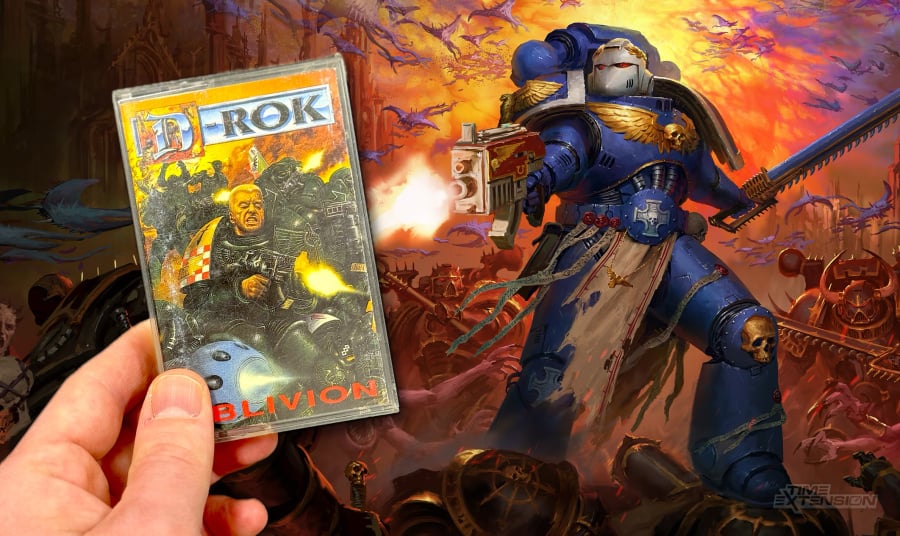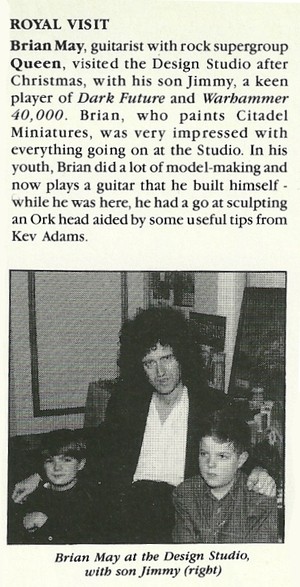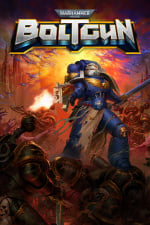
"Boomer shooter" Warhammer 40,000: Boltgun has to rank as one of 2023's more pleasant surprises.
Developed by Auroch Digital, it takes the grimdark universe of Games Workshop's Warhammer 40,000 and transforms it into a Doom-style FPS, packed with gory kills, pixel-drenched visuals and fast-paced action. "We’d recommend this to anyone looking for a solid boomer shooter to add to their library," said our friends at Nintendo Life. The affection that developer Auroch has for the world of Warhammer is plain to see, but the game contains a part of Games Workshop history that even hardcore fans might not be aware of.
If you're a long-time fan of the Warhammer world, then there's a good chance something might stand out as you play Boltgun – its main menu music. The game contains the 1991 album Oblivion, recorded by short-lived British hard-rock outfit D-Rok and released on Games Workshop's equally short-lived Warhammer Records label (amazingly, this isn't the first time D-Rok's music has been used in a video game; a snippet of "Get Out of My Way" can be heard in EA's 1993 release Space Hulk).

It's perhaps time for a little history lesson. Warhammer Records was part of the company's plan to diversify its business, which, back in the late '80s and early '90s, was primarily focused on selling table-top board games and lead-based miniatures. First up was Sabbat, whose Warhammer-inspired song "Blood for the Blood God" was given away free as a flexi-disc vinyl with issue 95 of White Dwarf, Games Workshop's print magazine (which is still in print today).
Then came Bolt Thrower's 40,000-themed 1989 album Realm of Chaos, which was released on Earache Records and featured John Sibbick's artwork for Warhammer 40,000: Rogue Trader, the first edition of the 40k ruleset. Then came D-Rok, signed to create the first 'true' album for the new Warhammer Records label, which would be followed by Nottingham-based Wraith's Danger Calling in 1992.
Outside of the Game Workshop connection, Oblivion's most notable claim to fame is the fact that Queen's Brian May plays the guitar on two of its songs: "Get out of My Way" and "Red Planet Blues". Speaking to Kerrang! magazine at the time of the album's release, D-Rok lead singer Simon "Sigh" Denbigh (formerly of The March Violets and Batfish Boys, the latter of which had previously appeared in White Dwarf magazine) explained that May became involved with the album after visiting a Games Workshop store with his son, James (coincidentally, a similar story links May with Star Fleet, the English localisation of the Japanese puppet show X-Bomber – May recorded a cover version of the theme tune at the behest of his son).
Speaking to Classic Rock's Scott Rowley some years later, Denbigh explains the birth of the project in a little more detail:
When I was in the Violets, this band had supported us a Coventry University and apparently I’d been really nice to them and this guy from the band went on to work for Games Workshop. One day I came home off a tour and there was a box the size of a house full of Games Workshop stuff and they said: ‘Do you want to do a record for us?’ I got in touch with Brian May and he came over and played on some tracks – most of which I mixed out. And they released it on their own Warhammer label. And ruined it, basically, because they had no idea what to do.
I was 12 years old when Oblivion was released in 1991, and steadfastly held in the iron grip of Warhammer fever. Everyone at my school played it, and it was a daily ritual to bring in your badly painted miniatures to show off to friends. I bought White Dwarf every month and even had the briefcase-style carry case with foam inner sections designed to protect your valuable Space Marine army as you walked to your friend's house for battle. When I saw the first adverts for Oblivion in the pages of White Dwarf, I knew I had to own it. One purchase of a cassette later, and I subjected my family to the album on repeat during road trips and holidays. The songs became ingrained in my psyche.
Sadly, it would seem that not enough people felt the same way. D-Rok toured with legendary British rockers UFO, but couldn't find lasting success. "It didn’t do very well," Denbigh tells Rowley. "It was just about the time Nirvana kicked off, and it didn’t matter: you couldn’t get arrested unless you were American and grungy." Post D-Rok, Denbigh would dabble in electronic music and launch his own short-lived record label before joining The Sisters of Mercy in 1995, but sadly suffered a life-changing stroke in 2016.
Oblivion is incredibly rare these days, and copies of the cassette have been known to change hands for large sums of money on sites like eBay (the CD version is even rarer, by all accounts). You also won't find it on any music streaming service, although a good-quality CD rip is available on YouTube.

So, how on earth did this incredibly obscure piece of Games Workshop history find its way into a video game in 2023? We asked Auroch Digital's Marketing and Comms Director Jemima Crow to find out.
"We are really proud of having the Oblivion album by D-Rok in Warhammer 40,000: Boltgun as our menu music," Crow exclusively tells Time Extension. "At Auroch Digital, we are huge Warhammer fans; there are so many people from all over the studio that play, especially our Studio Director Tomas Rawlings, who started playing Warhammer with 3rd edition Warhammer Fantasy Battle and Warhammer 40,000 with 1st edition – both launched in 1987!"
Crow reveals that there are many fans of the game working for Auroch Digital, and the studio wanted to include as many cool features as possible in the game – features that would appeal to hardcore fans of Warhammer. "When making Boltgun, we wanted to put in as many Easter Eggs and fun nods for Warhammer fans as we could. We thought the menu music would be a great place to do this, so we asked Games Workshop for some ideas. Together, we eventually came to the idea to use music from D-Rok, given its long history in relation to Warhammer 40,000."
Given that the album is no longer available commercially (it has never been reissued since 1991), this wasn't a case of simply grabbing the MP3 files online and dropping them into the game – it required some serious effort.
Auroch's Audio Designer, Matthew Walker, was the man responsible. He told us:
Including the 'Oblivion' album by D-Rok as part of Boltgun's sonic identity was a fantastic factor in presenting the game to players - almost like the rising or opening of the curtains before a show. The only real treatment we applied was the removal of the vocals [outside of the Credits], otherwise this would fight for the same frequency space as the UI SFX. We also edited each tracks arrangement slightly - doing this, allowed us to apply 'Oblivion' as the perfect musical bed ahead of the ensuing chaos.
As it happens, Boltgun is up for a TIGA award for Audio Design. "One of the reasons is the care and passion that was put in by Matt and the rest of the team to every part of the audio, including the menu music," adds Crow. "This care and passion went into every element of the game and has come together in making an amazing game we are really proud of."








